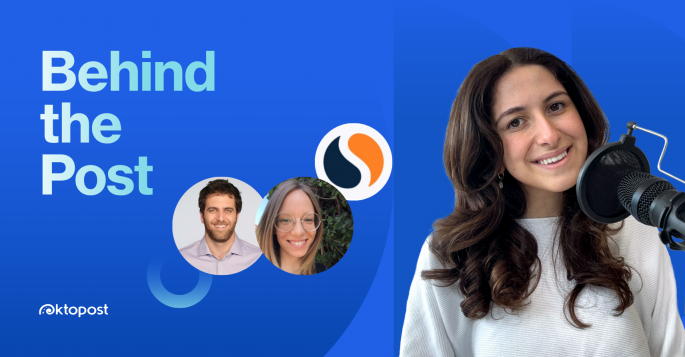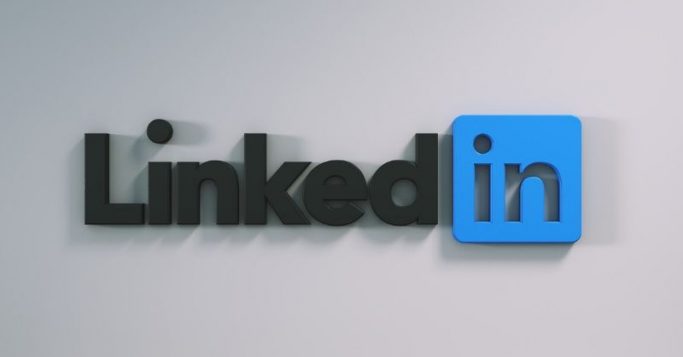
How we used employee advocacy to increase social conversions by 266% in 90 days
In the past few months, we’ve made a lot of noise around employee advocacy.
And for good reason – according to the State of B2B Marketing report we performed in late 2021, we found that nearly half of CMOs said employee advocacy was their best-performing social initiative.
We then decided to look deeper into our own user-based employee advocacy statistics, and we found that those using a formal employee advocacy program earned 25-40% more engagement than those who didn’t.
We performed webinars, published reports and infographics, recorded countless podcasts, and even launched some helpful resources to get you started with employee advocacy.
Now, we’re getting radically transparent. Here’s how we used employee advocacy to grow our own social conversions by 266% in just 90 days.
Want to read it later? Take these insights with you! [Direct Download]
Quick jump links
- Employee Advocacy Revamp: The Set-Up
- Education and Launch
- Maintaining the Hype
- The Results of Our Employee Advocacy Program
- Overall Engagement Results
- Insights from the Employee Advocacy Competition
- Clicks and Conversions from Employee Advocacy
- Key Takeaways
Employee advocacy revamp: the set-up
In late 2021, we decided that we were going to re-motivate our colleagues participating in our employee advocacy program. We decided to roll out our employee advocacy program in three main phases:
- Education and Launch
- Maintenance
- Results
Instead of basing it on the number of shares, we opted for a contest based on who generated the most clicks throughout the quarter.
Why?
Because we wanted our advocates to use best practices for social media in order to create value as opposed to noise. It’s simple to share with reckless abandon, but spamming different social platforms doesn’t earn you any value.
So, to better encourage best practices and make sure that we’re getting results from our employee advocacy program, we based it off of clicks.
Education and launch
If we wanted our colleagues and employees to use best practices for social media, we had to start by telling them what those practices are.
It’s counterproductive to have our employees blindly share everything from the advocacy board. While that looks great in terms of advocacy engagement, it doesn’t achieve what we really wanted, which was meaningful engagement, real conversations, and traffic generation.
To kick off our competition, we held a company-wide meeting and prepared a best-practices presentation with an announcement for our advocacy competition kick off.
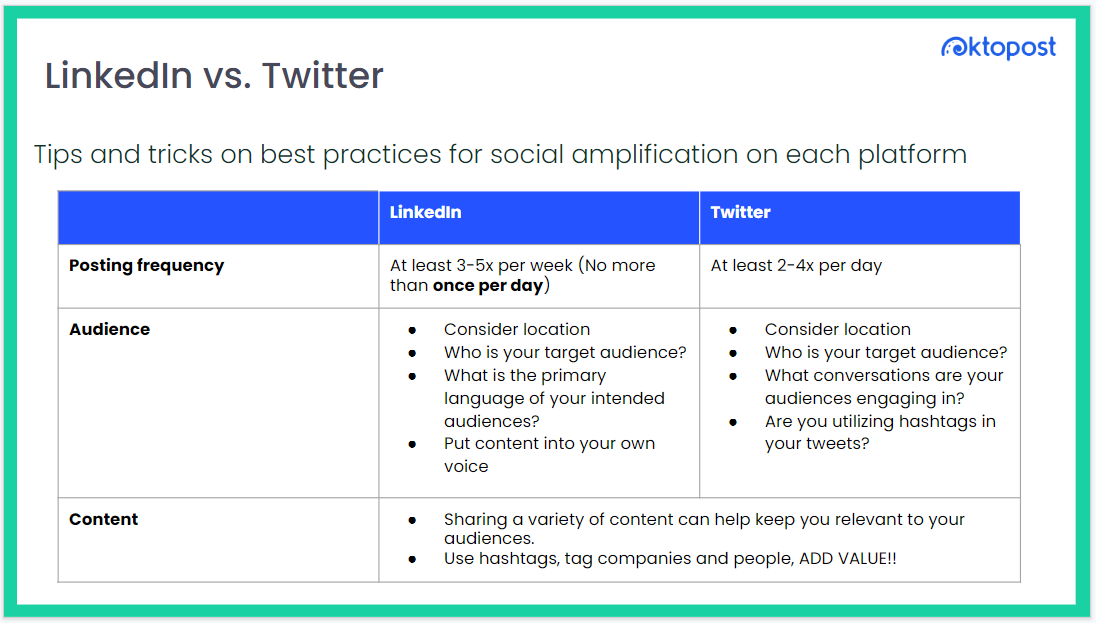
We educated our employees on the best times to post and posting frequency on each channel. We explained what kinds of content work best on each social network, and the core truths that hold true regardless of channel.
Once we’d gone over the basics, we launched into the contest rules, and the competition had begun.
The rules were simple: we’d run a competition for 90 days through all of Q1. We’d create more content than ever before for the advocacy board, and we’d try new kinds of content to push engagement. By the end of the quarter, the top three advocates with the most clicks on their posts would win cash prizes.
We offered three monetary prizes for the competition:
- First place: $100
- Second place: $50
- Third place: $25
We excluded both the executive team and the contest coordinators from the competition. As part of our goals for this competition, we wanted to encourage employees who weren’t normally active advocates for us.
Maintaining the hype
Immediately, we had more activity from our advocates. But we had to keep up the momentum – this is the hard part.
How do you keep the competition top-of-mind so that advocates keep engagement high?
We focused on creating excellent content for the advocacy board. We developed new filters so that different teams could share content uniquely relevant to their own jobs. Relevant content helped our advocates start real conversations and begin developing their personal brands.
We split our content into three main categories:
- Oktopost content: branded corporate content that we shared about Oktopost, news, created content, and more.
- Industry content: curated content that involved our industry, B2B marketing, and social media news.
- Personal interest content: we tried to curate content that related to each teams’ individual interests. For example, external content around sales tactics for our sales team was a popular choice.
We also focused on keeping the competitive spirit alive with weekly contest updates in Slack. This was important, as employees engaged with those posts to congratulate each other or poke at the competition a bit.

An unexpected side effect of this is that while it was a competition, it felt more like a team effort. These posts unified the team in promoting our advocacy program and engaging with the posts we created.
The results of our employee advocacy program
We put all of this work into the employee advocacy program. We educated our advocates, created great content for them, and inspired them to create the content they wanted to see on their social networks. We kept them motivated with weekly updates in Slack.
How did our efforts impact engagement across our socials?
Overall engagement results
First, our sessions improved from Q4 2021 to Q1 2022 by 53%. We had more employees connecting and using the advocacy board than ever before.
Not only were employees connecting and engaging with the advocacy board, but they were sharing more often, too – we experienced a 24% lift in post shares as well.
However, as we focused on clicks and engagement for the contest, shares weren’t the most important to us. We wanted our employees to share content that they felt strongly about, and modify it, so it sounded like it was coming from their unique perspectives.
It paid off – we increased our total engagement by 63%.
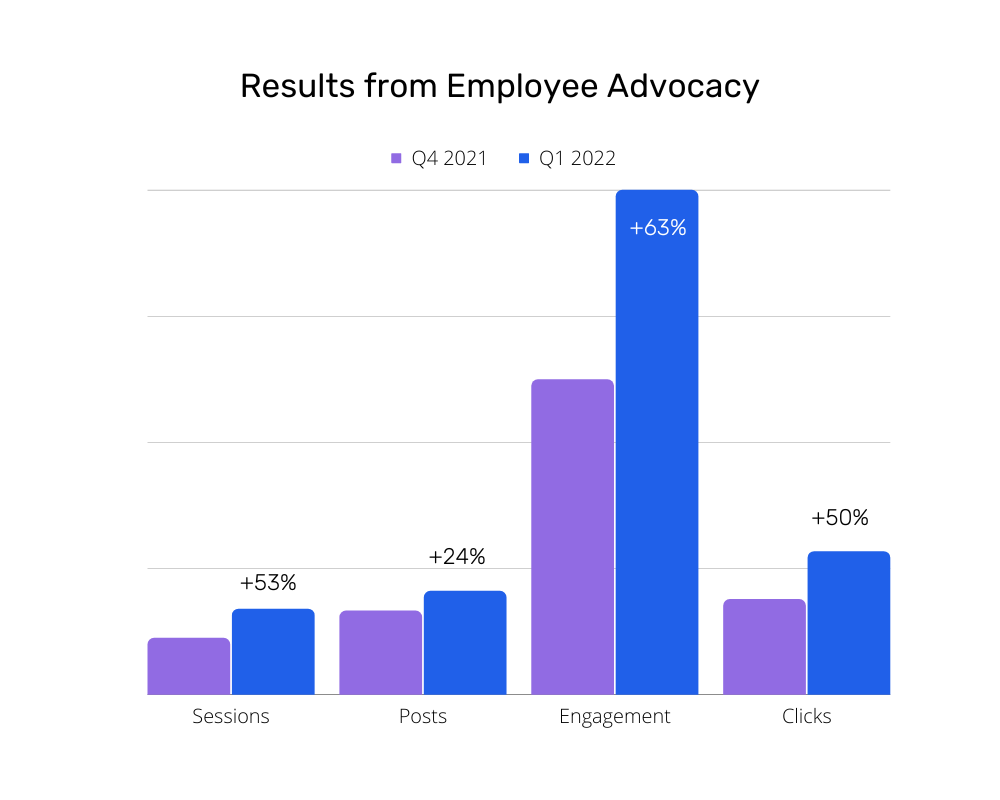
This is unprecedented, as every marketer will tell you that more messages usually equates to lower engagement, regardless of the channel. However, the messages were more relevant and, thus, earned more engagement over the previous quarter.
Clicks alone, the metric for which we judged the contest, increased by 50%, driving more traffic to our site from our advocates.
Insights from the employee advocacy competition
During our employee advocacy competition, we saw an average net increase of 81% across every day of the week. The days with the biggest shift in engagement actually happened over the weekend. Saturdays earned 205% more engagement in Q1 over Q4, and Sundays earned 114% more engagement.
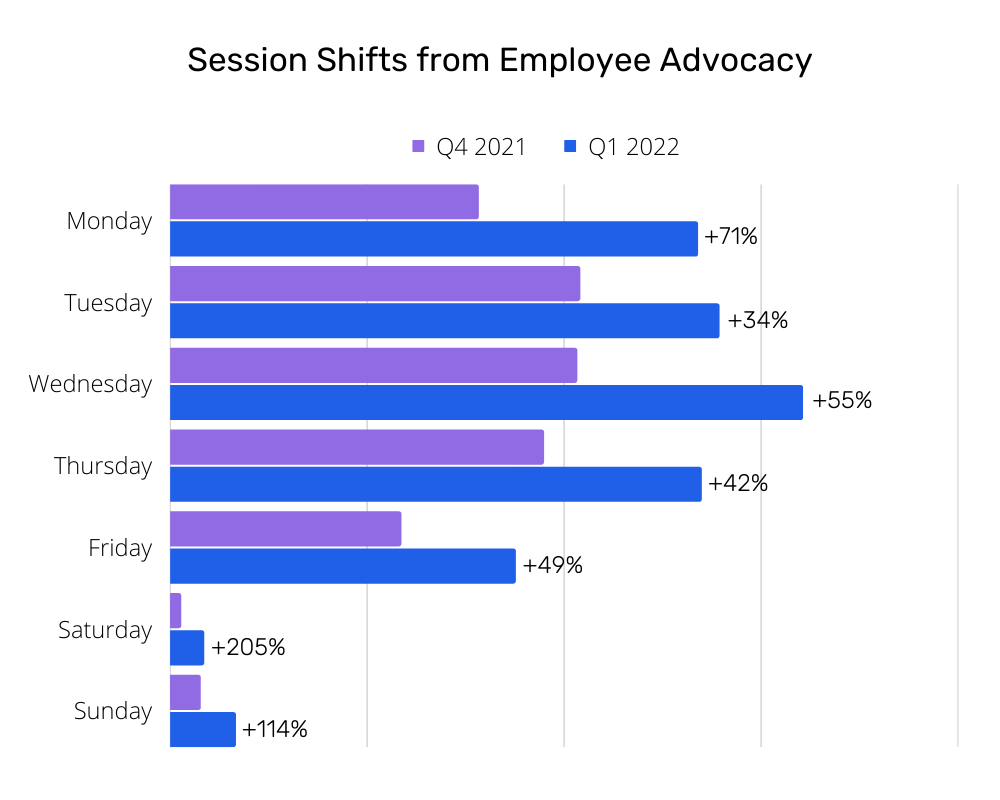
I think it’s worth noting a few things concerning this hike in weekend sessions:
- We encouraged advocates to try posting on the weekend, as we found that the fewest posts were shared on these days. It was worth testing to see if we’d get more engagement on the weekends with less competition in social feeds, so we suggested employees schedule a few posts over the weekend.
- We have some employees on a Sunday-Thursday work week. As a good chunk of our employee base works on this schedule, it’s important to note that we would potentially have more sessions over the weekend than a company with everyone on a Monday-Friday work week.
Regardless, Saturday is the one day everyone shares off work – and it had the biggest change in sessions during the competition.
The most popular day from Q4 to Q1 continued to be Wednesday, however Q1’s employee advocacy competition brought a 55% lift in sessions over Q4. Of the classic Monday through Friday work week, Monday saw the biggest % growth in sessions at 71%.
Clicks and conversion from employee advocacy
The biggest difference we saw between Q4 2021 and Q1 2022 was in our number of clicks and conversions from advocacy.
Clicks:
Since the goal behind the contest was earning more clicks from advocacy content, it made sense that we’d earn more clicks over Q4 2021. However, we didn’t anticipate how much of an increase there would be.
In Q1 2022, we earned 50% more clicks over the previous quarter – which is significant because engagement didn’t drop from Q4 to Q1. We’d anticipated that more posts would drop overall engagement, but our engagement and clicks only increased.
This means that we weren’t earning our clicks simply through an increase in posting from our advocates, instead, the content itself was of higher quality.
This is an important distinction: simply posting more on social media isn’t the goal for any account, much less an advocacy program. It’s about posting better, more qualitative content.

Conversion:
While we were already impressed with the results from our employee advocacy, we didn’t expect the impact on conversion.
In terms of actual number of conversions, we saw a 266% increase between Q4 2021 and Q2 2022. While we might be able to attribute this to increased posting, the data points to higher relevancy as the cause for this lift in conversion.
Recommended for further reading
Key takeaways:
- Education and a definitive launch were critical to our success with our employee advocacy program. Where we had many advocates sharing to share, we now had them starting their own conversations and creating their own thought leadership.
- Creating highly relevant content that made sense for each individual team was a game-changer in how employee advocacy performed over the quarter.
- Incentivizing the program with a competition motivated Oktoposters to share content often, and basing the competition off of clicks helped drive personalized content that performed well.
The results were clear: our efforts earned:- More overall advocacy sessions
- Increased posting
- Nearly double the engagement
- Nearly triple the conversions
Employee advocacy is as much a science as it is an art. When you look to the data we’ve published, it’s clear that this is an initiative that can increase the ROI of your socials when done right.
The key lies in education and motivation: when you can educate your employees and provide the motivation (both through incentives and creating content they actually want to share), employee advocacy is an unstoppable force for your marketing strategy.
Ready to get started with employee advocacy?
